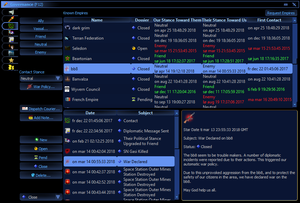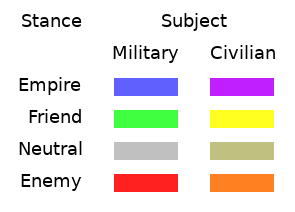Diplomacy: Difference between revisions
(Updated the picture code.) |
(Restored) |
||
| (12 intermediate revisions by 3 users not shown) | |||
| Line 1: | Line 1: | ||
{{ | [[file:EmpireDiplomacy.png|thumb|right|Empire diplomacy window.]] | ||
{{Irrelevant|As Starship is singleplayer and pirates are always hostile, most of this window isn't useful. Only the Dossier section is relevant}} | |||
The diplomacy window is used to control the political stances towards other empires, and keep a history of events and diplomatic messages with them. | |||
[[ | ==War Policy== | ||
== | The war policy is a set of rules that depict when a hostile action would result in a war. | ||
There are a lot of options, such as: | |||
* Citizens killed | |||
* Spacecraft destroyed | |||
==Dossier== | |||
The diplomatic dossier is the collection of events and diplomatic communications between each [[empire]] and your empire. | |||
Dossier entries include events such as units lost to attacks by the empire, worlds attacked by the empire and political stance changes with the empire. But also diplomatic messages sent to and received from the empire. It is also possible to leave private notes for just your empire to see. | |||
Each dossier entry has a state that can be used to help keep track of which events are important to you. War policy will react to the number of non-closed dossier entries and declare way if the specified number of entries are met. | |||
Dossier entries can be delete if so desired, but you cannot affect what dossier entries the other empires see. | |||
When there is any dossier entry with a ''New'' state, the [[Governance]] and ''Diplomacy'' buttons on the HUD will glow. Change the state of the dossier entries to any other state to stop this effect. | |||
==Political Stances== | |||
[[Empire]]s have 5 different views they can take of one another: Neutral, enemy, friend, vassal, and ally. The relationship between two empires is determined separately by each empire; an empire could be neutral towards someone that is friendly towards them, or an enemy of someone who is neutral. | |||
When an empire change political stance to something lower, the other empire is also lowered to that political stance, unless it is already lower. For example, setting a friend to natural will change their stance toward you to natural as well. | |||
===Neutral=== | |||
Neutral is the default political stance, it can symbolize a case-fire or an otherwise non-aggressive stance. | |||
Any hostile action committed by a neutral empire can result in a war if the action violate the war policy. | |||
===Enemy=== | |||
Enemy can symbolize a defensive stance, a hostile stance or even war. | |||
When an empire has an enemy stance toward another empire, their [[Space_Station|space station]]s, [[officer]] commanded [[spacecraft]], and [[Military_Weapon_System|military weapon system]]s will open fire on that empire. | |||
Firing upon another empire's unit, vehicle, spacecraft, etc... will automatically set both empires as enemy of each other and can only be changed by each empire's [[government]]. | |||
===Friend=== | |||
Friend can symbolize a peace treaty. | |||
This status opens up a series of features: | |||
* If the empire's [[commerce]] policy has been edited, this will grant the friendly empire access to the "friends only" items. | |||
* It will also open up the option to speak via the "Friend" [[communication]] channel (Note: all your friends may see your messages but might not see eachother's messages). | |||
* This will also allow your empire to receive alerts from friends if they're being attacked. | |||
===Vassal=== | |||
Vassal can symbolize many different things, such as surrender, subjugation, and extortion. | |||
An empire that is a vassal to another pays 10% or more of their [[capital]]'s [[treasury]] in [[tribute]] each day to the other empire. This state usually implies a type of protection by the larger Empire. | |||
It can also possibly be used by a conquering empire to subjugate other Empires without completely destroying them, which is both more kind as well as eliminating management for the conquering empire. | |||
Being a vassal of another empire will also "add" your empire's score to the other empire. An empire may have many vassals, but can only be vassal of one empire. | |||
===Ally=== | |||
Ally can symbolize an alliance. | |||
The smaller empire appears similarly to a vassal, underneath the larger one. As with a vassal, the statistics of the smaller are added to the empire that you declared your allegiance to on the empire rankings page. | |||
Tribute to an ally is optional by being 0%, but can pay between 0%-9% in tribute to the allied empire, more tribute will change the stance to vassal. | |||
An empire may have many allies, but can only be ally of one empire. | |||
==Political Stance Colors== | |||
Political stance is indicated by color when spotting units. | |||
[[file:PoliticalStanceColors.png]] | |||
==Common practices== | |||
* Experienced empires set enemy stance towards all other empires by default. This helps to prevent trespassing, theft, and spying. This may not mean they intend to be hostile though. | * Experienced empires set enemy stance towards all other empires by default. This helps to prevent trespassing, theft, and spying. This may not mean they intend to be hostile though. | ||
* Larger diplomatic talks are usually conducted in the [http://hazeron.com/ | * Larger diplomatic talks are usually conducted in the [http://hazeron.com/mybb/forumdisplay.php?fid=13 Diplomacy section on the forums]. | ||
[[Category:User_Interfaces]] | |||
[[Category:Empires]] | [[Category:Empires]] | ||
Latest revision as of 07:03, 2 March 2024

The diplomacy window is used to control the political stances towards other empires, and keep a history of events and diplomatic messages with them.
War Policy
The war policy is a set of rules that depict when a hostile action would result in a war.
There are a lot of options, such as:
- Citizens killed
- Spacecraft destroyed
Dossier
The diplomatic dossier is the collection of events and diplomatic communications between each empire and your empire.
Dossier entries include events such as units lost to attacks by the empire, worlds attacked by the empire and political stance changes with the empire. But also diplomatic messages sent to and received from the empire. It is also possible to leave private notes for just your empire to see.
Each dossier entry has a state that can be used to help keep track of which events are important to you. War policy will react to the number of non-closed dossier entries and declare way if the specified number of entries are met.
Dossier entries can be delete if so desired, but you cannot affect what dossier entries the other empires see.
When there is any dossier entry with a New state, the Governance and Diplomacy buttons on the HUD will glow. Change the state of the dossier entries to any other state to stop this effect.
Political Stances
Empires have 5 different views they can take of one another: Neutral, enemy, friend, vassal, and ally. The relationship between two empires is determined separately by each empire; an empire could be neutral towards someone that is friendly towards them, or an enemy of someone who is neutral.
When an empire change political stance to something lower, the other empire is also lowered to that political stance, unless it is already lower. For example, setting a friend to natural will change their stance toward you to natural as well.
Neutral
Neutral is the default political stance, it can symbolize a case-fire or an otherwise non-aggressive stance.
Any hostile action committed by a neutral empire can result in a war if the action violate the war policy.
Enemy
Enemy can symbolize a defensive stance, a hostile stance or even war.
When an empire has an enemy stance toward another empire, their space stations, officer commanded spacecraft, and military weapon systems will open fire on that empire.
Firing upon another empire's unit, vehicle, spacecraft, etc... will automatically set both empires as enemy of each other and can only be changed by each empire's government.
Friend
Friend can symbolize a peace treaty.
This status opens up a series of features:
- If the empire's commerce policy has been edited, this will grant the friendly empire access to the "friends only" items.
- It will also open up the option to speak via the "Friend" communication channel (Note: all your friends may see your messages but might not see eachother's messages).
- This will also allow your empire to receive alerts from friends if they're being attacked.
Vassal
Vassal can symbolize many different things, such as surrender, subjugation, and extortion.
An empire that is a vassal to another pays 10% or more of their capital's treasury in tribute each day to the other empire. This state usually implies a type of protection by the larger Empire.
It can also possibly be used by a conquering empire to subjugate other Empires without completely destroying them, which is both more kind as well as eliminating management for the conquering empire.
Being a vassal of another empire will also "add" your empire's score to the other empire. An empire may have many vassals, but can only be vassal of one empire.
Ally
Ally can symbolize an alliance.
The smaller empire appears similarly to a vassal, underneath the larger one. As with a vassal, the statistics of the smaller are added to the empire that you declared your allegiance to on the empire rankings page.
Tribute to an ally is optional by being 0%, but can pay between 0%-9% in tribute to the allied empire, more tribute will change the stance to vassal.
An empire may have many allies, but can only be ally of one empire.
Political Stance Colors
Political stance is indicated by color when spotting units.
Common practices
- Experienced empires set enemy stance towards all other empires by default. This helps to prevent trespassing, theft, and spying. This may not mean they intend to be hostile though.
- Larger diplomatic talks are usually conducted in the Diplomacy section on the forums.
